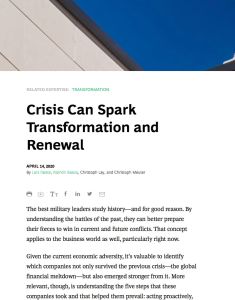Join getAbstract to access the summary!

Join getAbstract to access the summary!
Lars Faeste, Ramon Baeza, Christoph Lay and Christoph Meuter
Crisis Can Spark Transformation and Renewal
Boston Consulting Group, 2020
What's inside?
Leveraging strategies that proved successful after the 2008 fiscal crisis may help firms survive the pandemic.
Recommendation
Lessons learned from companies that performed well after the 2008 economic downturn offer leaders valuable guidance in the face of the COVID-19 pandemic. The top post-2008 performers followed five essential steps. According to Boston Consulting Group senior partners Lars Fæste and Ramón Baeza, and the firm’s Christoph Lay and Christoph Meuter, these companies acted preemptively; kept invigorating their business; held to their key goals; had risk mitigation in place; and “streamlined” operations by leveraging technology. Embrace the authors’ discoveries to position your firm for continued good health.
Take-Aways
- Lessons learned in the 2008 crisis have value today.
- Recovery from the 2008 crisis occurred in four phases.
- Five actions were central to the strategies of the companies that performed best after the downturn.
Summary
Lessons learned in the 2008 crisis have value today.
The strategies that companies used to overcome the devastation of the 2008 global financial crisis provide valuable lessons for businesses trying to cope with the COVID-19 pandemic.
To understand what companies learned from the financial crisis, Boston Consulting Group (BCG) analysts examined the S&P Global 1200 from 2008 to 2019. By evaluating earnings before interest, taxes, depreciation and amortization (EBITDA) and the total shareholder return (TSR), BCG identified the top 25 performers.
“It’s valuable to identify which companies not only survived the previous crisis…but also emerged stronger from it.”
Their findings revealed that the top tier of companies across numerous industries increased their EBITDA margin by 25% on average, compared to 4% for other S&P Global 1200 companies. Regarding shareholder returns, the top 25 outperformed the competition with an average of 21% annual growth compared to 4%. Although the top 25 organizations underwent a significant decrease in TSR in 2008, they returned to productivity more quickly than other companies.
Recovery from the 2008 crisis occurred in four phases.
During the first recovery period, from 2008 to 2010, these companies dealt with market instability by keeping almost 20% of their assets in cash and cash equivalents. As the market stabilized in 2011 and 2012, they used these funds to operate during low revenue periods.
“They succeeded by tailoring their strategy to the changing macro conditions of each phase.”
When the global economy started moving again, these businesses grew an average of 19.5% during the four years ending in mid-2016. By 2016, these firms had positioned themselves to acquire other companies and reinvigorate their core areas.
Five actions were central to the strategies of the companies that performed best after the downturn.
The top 25 companies took five steps crucial to their long-term viability:
- They acted prior to the crisis – Unlike the other 80% of companies in the Global 1200 study, these firms took measures in advance of the crisis. For example, casino-resort owner Galaxy Entertainment Group, which ranked sixth, sold 20% of the company to a private-equity firm in 2007. This sale, to a group with knowledge of “global gaming,” brought Galaxy expertise and $1 billion in capital. The same year, Galaxy “issued new equity shares” and used the proceeds to pay down debt.
- The top companies kept moving forward – As the marked gyrated, they focused on long-term growth. They streamlined their product development processes, redefined corporate strategy and investigated new offerings. The American medical equipment company Abiomed, for example, which came in second in the analysis, turned from its core goal – creating the first artificial heart – after its 2005 acquisition of a company that produced Impella, a tiny heart pump. Revenue from Impella’s pumps are now the company’s major source of revenue.
- They changed how they achieved their goals – However, their objectives stayed the same. Their pre-crisis vision remained clear and defined. Third-ranked Booking Holdings, for example, held onto three core goals: growth through partnerships, better digital capability through acquisitions and increasing its travel-related services. In 2010, the company, formerly called Priceline, was the world’s biggest internet hotel reservation service.
- The top companies created “scenario-planning” groups – These planning groups focused on future trends and possible crises. These companies’ cash reserves were on average twice that of the other Global 1200 companies. The high-end fashion group, Kering, which is 18th on the list, sought diverse employees and created training partnerships. The company, in which women hold half of all leadership roles, created future-oriented partnerships with an Italian tailoring school and the London College of Fashion.
- Strong performers refined their core functions – They changed their processes to leverage their technology and adopted other cost-saving measures in preparation for possible upcoming crisis. While other companies take these actions only when events force them to, the top companies had the foresight to put them in place in advance. Ashtead Group, a UK equipment rental company with divisions in Canada and the United States, came 16th in the analysis. At the end of 2008, it combined or closed more than 100 outlets, cut staff by almost 25% and reduced its number of “delivery vehicles.” The result was a saving of almost $100 million per year.
These actions helped corporate leaders successfully navigate the financial crisis of 2008.
“The top performers built organizations not only to withstand future shocks but also to anticipate them.”
Their experiences may offer worthwhile guidance for managing the impact of the coronavirus pandemic on the well-being of your business.
About the Authors
Lars Fæste, in Hong Kong, and Ramón Baeza, in Madrid, are Boston Consulting Group managing directors and senior partners. Christoph Lay is a Global Business Director in Düsseldorf, where Christoph Meuter is a Senior Knowledge Analyst.
This document is restricted to personal use only.



















Comment on this summary